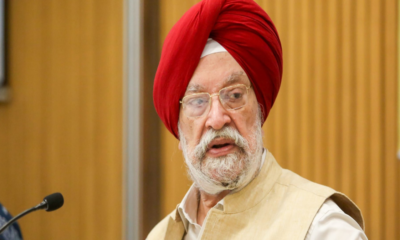The RSS on Monday started a three-day lecture series in Delhi to reach out to people in a bid to try and explain to them what the organisation is about as also its views and approach on key issues of the country.
Talking about the meet that will continue until Wednesday, senior leaders of the RSS said while outreach programmes have been organized since 1985, this is the first time RSS chief Mohan Bhagwat will address more than 1,100 people on the organization’s views on various crucial issues, according to media reports.
Hindutva would be the central theme of the event, said media reports.
The highlight of the event is likely to be talks delivered on all three days by RSS chief Mohan Bhagwat, presenting the Sangh’s view on various contemporary issues. The programme, titled ‘Future of Bharat: An RSS Perspective, is slated to be attended by dignitaries, including religious leaders, film stars, sportspersons, industrialists and envoys from different countries.
“It was decided that initially, Mohan Bhagwat will talk about the organization and its views and later, he would take questions from people. This is a way to reach out to intellectuals, professionals, various other sections of people,” said a senior RSS functionary who is part of the outreach exercise on condition of anonymity.
The outreach programme is significant because it is the first interactive session of the RSS chief with a large gathering, with members of the RSS now being part of the ruling National Democratic Alliance (NDA).
In all more than 1,000 guests are on the list of invitees. “Attending an RSS event is not against service rules,” said a spokesperson. Leaders of different faiths are also invited. While the media is invited, cameras won’t be allowed. However, for the first time, RSS will be providing a live feed of the entire event.
The event, however, will not see the presence of top opposition leaders. Congress president Rahul Gandhi, CPI(M) General Secretary Sitaram Yechury and Samajwadi Party chief Akhilesh Yadav would stay away from the event. While Akhilesh has made his decision known, the CPI-M said Yechury was travelling and in any case they had no invite from the RSS.
The Congress, too, mocked the event. “RSS and BJP have been spreading this fake news for a while regarding sending invites as if it was some kind of a medal of honour,” party spokesperson Randeep Singh Surjewala said. “No such invite has been received by the Congress party and it is not a medal of honour. Their inherently hate-filled agenda is known to one and all.”
The lecture series will be held at Vigyan Bhavan in the heart of Delhi, a venue reserved for government functions. The allotment guidelines clearly say private bodies and NGOs would be allowed only for the days “President, the Vice-President or the Prime Minister attend the function”. The Centre reportedly used its ‘discretionary powers’ to allow the event at the venue, according to a report in The Economic Times (ET).
RSS leaders said many people are curious to know about the organization’s influence on the government and its views on critical issues concerning the country. “Today, Bharat (India) is moving ahead towards regaining her special and unique position in the world. The RSS is realising that there is a growing eagerness amongst larger sections of the society including the intellectuals and the youth to know and understand the RSS perspective on various issues,” said RSS chief spokesperson Arun Kumar.
Bhagwat would join an interactive session for the first time because many people are keen to know about the organization, said media reports quoting a RSS source.
“There is great curiosity among people to know about RSS. We are getting at least 10,000 requests every month from people who want to join the organization. This initiative is also an attempt to reach out to more people,” the RSS leader added.
Mohan Bhagwat will also interact with select audience comprising prominent citizens during the lecture series.
The event follows Bhagwat’s address at a recent second World Hindu Congress in Chicago where the RSS chief urged Hindus to unite.
Senior RSS leaders said the interactive session with Bhagwat would not be taken up again for a few years. RSS leaders said the organization would make use of social media platforms to publicize the outreach programme and it would be shown live across the world.
“The RSS has organized several outreach programmes in the past. The first outreach exercise was organized in 1985 when the organization went to villages and cities to inform people about the organization. Similar exercises were undertaken in 1989 and 2001,” said the RSS leader.


 India News2 hours ago
India News2 hours ago
 LATEST SPORTS NEWS1 hour ago
LATEST SPORTS NEWS1 hour ago
 India News1 hour ago
India News1 hour ago
 India News1 hour ago
India News1 hour ago













